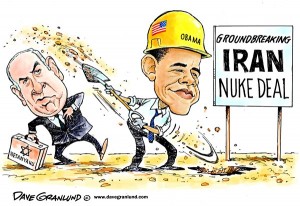US officials said they can see a “path forward” to reaching a political agreement with Iran on the major elements of a final nuclear deal by the end of the month, in just six days’ time.
“We very much believe we can get this done by March 31,” a State Department official said.
“I don’t think we saw that before the last round,” the official added, referring to talks between Kerry and Iran Foreign Minister Mohammad Javad Zarif held in Lausanne March 15-20.
Kerry is due to resume talks with Zarif at a Swiss lakeside hotel here the morning of March 26. The schedule after that, including the possibility of other foreign ministers from the P5+1 (the five permanent members of the UN Security Council plus Germany) joining the talks remains for now very fluid, officials said. Kerry’s schedule after March 26 simply says “negotiations,” the US official said.
Ahead of Kerry’s arrival late March 25, lead US negotiator, Under Secretary of State Wendy Sherman, held talks with her Iranian counterpart, Deputy Foreign Minister Abbas Araghchi, to set up the Kerry-Zarif meeting. As in the last several meetings, US Energy Secretary Ernest Moniz and the head of the Atomic Energy Organization of Iran Ali Akbar Salehi are also due to attend the Lausanne talks. It is unclear if Iranian President Rouhani’s brother Hossein Fereydoun will attend, after the death of his mother last week.
“We are focused on getting a political framework that addresses all the major elements [of a comprehensive Iran nuclear deal],” the senior State Department official said.
If a political agreement is able to be reached, it is not yet clear exactly what form it might be released at least publicly, officials said.
“The goal is to have an agreement with Iran on as many specifics as possible,” the US official said.
Negotiators have given themselves an additional three months — til the end of June — to complete highly technical annexes that would accompany any comprehensive deal reached.
In the face of criticism from Israel and some members of Congress, the White House has fiercely defended the merits of a solid nuclear deal as the best way to ensure that Iran does not obtain a nuclear weapon.
“The bottom line is this — compared to the alternatives, diplomacy offers the best and most effective way to prevent Iran from obtaining a nuclear weapon, and this is our best shot at diplomacy,” White House chief of staff Denis McDonough told the J Street conference March 23.

